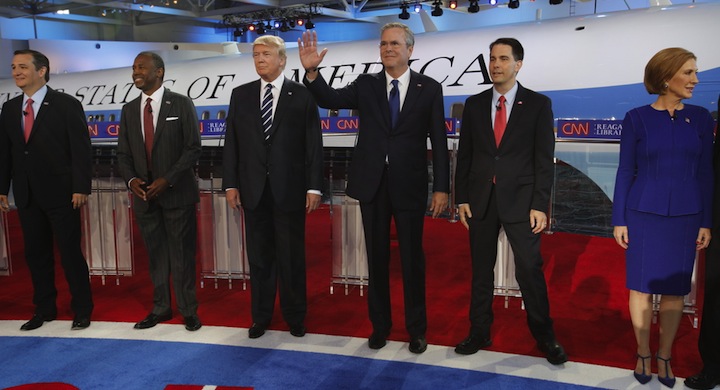For the first time since CBS/The Times began polling Republicans about their choice for a 2016 presidential candidate, Donald Trump slipped to a close second behind Ben Carson this week. When asked for an explanation, Trump seems genuinely confused. But the pundits have an answer. Over and over, they repeat the same line: Carson has appeal with evangelicals.
But “evangelical” is a label that has been hijacked and manipulated by the political establishment in America. When pundits refer again and again to the “evangelical vote, ” they are leaning on the Cliff Notes of the so called “far right”–the extreme religionists who use a perverted interpretation of faith to endorse an extreme agenda.
True evangelicalism that is or was spoken from the lips and words of Jesus places concern for the poor and the broken and the battered and the imprisoned and the blind and the bruised and those made to feel unacceptable at the center of faith. This evangelicalism seeks to invite all to care for the least of these, to have a deep concern for justice and love and mercy as it relates not just the individual piety and charity but to public morality social justice and governmental policies.
America’s abolitionists were evangelicals as they sought to proclaim the good news of liberty to the captive.
In the midst of the temperance, labor, and women’s suffrage movements, Charles Sheldon’s book In His Steps raised the question, What Would Jesus Do? as a deeply evangelical question.
The Social Gospel in this country was evangelical as it sought to win over the heart of the country and to save society from the ugliness of poverty and hurt and pain.
Dr King was in this sense an evangelical as he sought to call America out of racism and away from injustice into God’s beloved community.
The Moral Monday’s movement is evangelical as we seek to win over those who have been taught by a crafty oligarchy to vote against their own self-interest. In a reaction against the advances of the civil rights movement, the Southern Strategy taught Southern Republicans to talk about entitlement programs, states rights, private schools, and tax reform in a way that racialized programs and policies they had previously supported—programs that helped to lift millions out of poverty. After more than 40 years, poor whites in the South are still duped into voting against their own self interest. Their only consolation is that they get to be counted as the “evangelical vote.”
The issues have been framed in such a way that poor white people are asked to believe that their children’s future is being thrown away as free stuff to black and brown people. This drives many Southern whites (and so-called “evangelicals” elsewhere) to elect politicians who sell this myth before paying back the oligarchy with tax cuts for the greedy.
This is why we cannot allow the so-called “mainstream media” to keep saying certain candidates get the evangelical vote and are supported by evangelicals without understanding how this generalized application is flawed. I’m an evangelical and stand with many other evangelicals who do not believe policies that divide, destroy and have a disdain for the least of these is evangelical. Evangelicals must name this effort to hijack the faith of Jesus Christ and use it for purposes that are as far from the moral call of Jesus as the east is from the west.
We should not allow extremists to legitimize their agenda by calling it “evangelical.” Instead, we should work and pray to exorcise this thinking and seek to redeem the soul of America. The heart of public evangelicalism is an insistence that our nation must be born again. Our moral witness is to call people evangelically to listen to heart of the gospel, which is love and justice and mercy.

